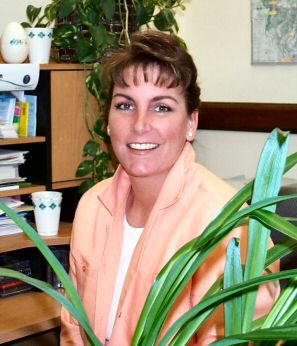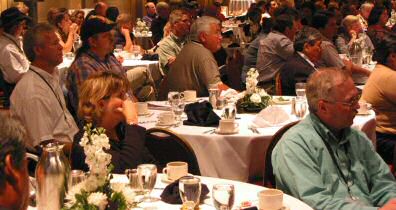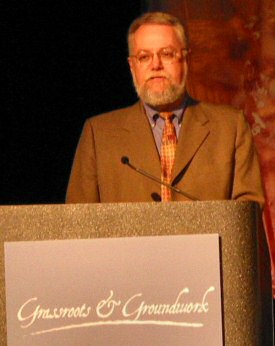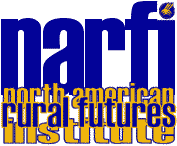Futures Thinker Bio: Leah Noel

Leah Noel has been infected by the future. Born in San Jose, California but growing up in Montana, Leah has lived in various places across the state – Billings, Bozeman, Chinook, Great Falls, Big Fork, Whitefish and Havre. She has also worked in a variety of environments – retail clothing, restaurant, legal office, hospital, university, and NARFI – filling a range of positions – from waitress, manager, administrative assistant, to legal secretary, bar tender, and executive assistant.
All this experience has given her wide perspective and keen powers of observation. These two traits in particular qualified her for a NARFI Futures Thinker mini-grant to attend the Grassroots & Groundwork: Practical Models for Reducing Poverty and Rebuilding Communities Conference.
"The number of people living in poverty in Montana is astounding." Leah told NARFI Director Babitsky in her conference debrief interview. "We're pretty isolated from each other and that's a contributing factor. Some people here believe that there is a template for reducing poverty, that there is some magic bullet, and that's just not true."
"At this conference I was blown away by the number of creative and innovative things that are being done elsewhere that can apply to north central Montana. Whether it's a project in inner city Detroit or Western Australia or Ames Iowa, there is a lot to be learned from each other. We really have to share knowledge, and work together. There just isn't any magic program that the government administers that will solve your problem. You have to use the assets you have as a community to reduce poverty in your region."
The isolation in geographically dispersed regions like Montana and the apathy of densely populated places like inner city Detroit may not wear the same face of poverty, but they share the same experience none the less. "We can learn from each other."
"Getting people to understand that YOU can make a difference is the key. You don't need to come up with 500 other people to work on the same problem. You don't need a huge grant or government funding. 'The more you know' is a really good slogan. If you really want to help make a difference, you have to do your homework and understand what's going on. If you don't like what's happening, even one person has the ability to change things."
Leah Noel's Conference Report

"Grassroots & Groundwork: Practical Models for Reducing Poverty and Rebuilding Communities", was held in St. Paul September 11th through the 14th and co-hosted by the Northwest Area Foundation http://www.nwaf.org/ and the Annie E. Casey Foundation http://www.aecf.org/. More than 400 people working to overcome poverty came together to highlight successes and share the lessons learned in the process.
Images of Community

On Sunday, conference attendees were able to view collections by Minnesota photographers capturing the many faces of communities throughout the world. Participants could also choose to view documentary films about poverty in America, "Love & Diane", "The New Americans: Finding Community", and "American Hollow".
A particularly interesting panel discussion of cultural observers and policymakers moderated by senior correspondent for "The News Hour with Jim Lehrer" Ray Suarez opened the conference on Sunday evening. The panel was comprised of the president of the National Congress of American Indians, a senior vice president at the Ad Council, a former mayor of Seattle and teacher at the JFK School of Government, and a Pulitzer Prize-winning journalist. Entitled, "Are We 'Boxing In' and 'Fencing Out', the panel offered its critique of the ways in which modern society depicts and shapes perceptions of poverty, and elicited thought-provoking questions and heart-felt comments from members of the audience. The discussion helped to paint what the picture of persistent poverty looks like in communities around the globe.
What's Working

On Monday, participants could choose to attend presentations to learn about what is working in poverty-reduction from urban, rural and reservation communities. I was inspired by a session hosted by the Move the Mountain Leadership Center in Ames, Iowa www.movethemountain.org/beyond_welfare entitled "Circles of Support". This high-impact strategy links community members with families who are experiencing poverty. The reciprocal relationships built in these groups help to break down the isolation many low-income families experience, and add meaning to the lives of middle-income individuals and participating families alike.
David Beurle of Innovative Leadership Australia hosted a session entitled "Get Out of the Box: Stimulating Innovation and Entrepreneurship in the Traditional Agriculture Landscape". He shared case studies of communities in rural Australia that he has worked with. One study in particular focused on Hyden, a community of approximately 600 about four hours from Perth. Hyden is a very isolated town that had little hope of growth or economic development. But the town and its self-reliant and entrepreneurial residents created the Hyden Tourism Development Company and in the 1970's, against the odds, created a world famous tourist destination, the Wave Rock Experience http://www.waverock.com.au. Since that time, Hyden now has a $5 million dollar hotel complex with an occupancy rate of 90%, an international airport, and sees 150,000 visitors a year. Mr. Beurle noted that this was accomplished by the efforts of the community as a whole, rather than a select group of individuals determining what the community needed to thrive. This and other projects have been awarded several state and international awards for excellence in rural community developments, have been credited with being a catalyst for changing the course of many towns.
A Perspective from Down Under
Mr. Beurle also gave a luncheon keynote address, and shared his views about what he feels is holding back rural communities in America. He wonders why the United States has an enormous number of economic development anti-poverty initiatives in place, yet continues to see an increase in poverty? "The programs are the 'matches'. There's a lot of striking going on, but what's missing? Oxygen." In order to breathe life into your community, Mr. Beurle believes three elements must be addressed:
- Vision. There may be many committed people in your community but no focus or vision. What is the community that you are creating?
- Responsibility. It's your community; how it ends up is your responsibility. Whatever it was that caused your community to be in its current condition is long gone. The future of the community is in the hands of the community NOW.
- Attitude. What you say about your community creates the environment, be it positive or negative. Economic development is directly related to community attitude.
Poverty is very complex by nature. It impacts so many aspects of life and is not exclusive of any particular segment of the population. I don't believe that an 'equation' exists that can accurately determine what qualifies as 'impoverished'. Regardless if you live in Detroit, Michigan, or Hays, Montana, poverty is poverty. For one family it might mean having to make the choice between paying a utility bill or buying groceries. To another it may be the lack of hope and self-determination that inhibits the attempts to reach personal and professional goals.
"Grassroots and Groundwork" underscored that successful and sustainable efforts to reduce poverty require practical, multidimensional approaches, and that lasting change takes time. By sharing knowledge gained in this struggle, communities can reduce the presence and impact of the harsh reality of poverty faced by millions of people across our nation.
Presentations from the conference may be available in the future from the Northwest Area Foundation http://www.nwaf.org/.
--Leah Noel--
NARFI Futures Thinker
